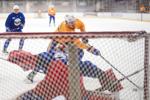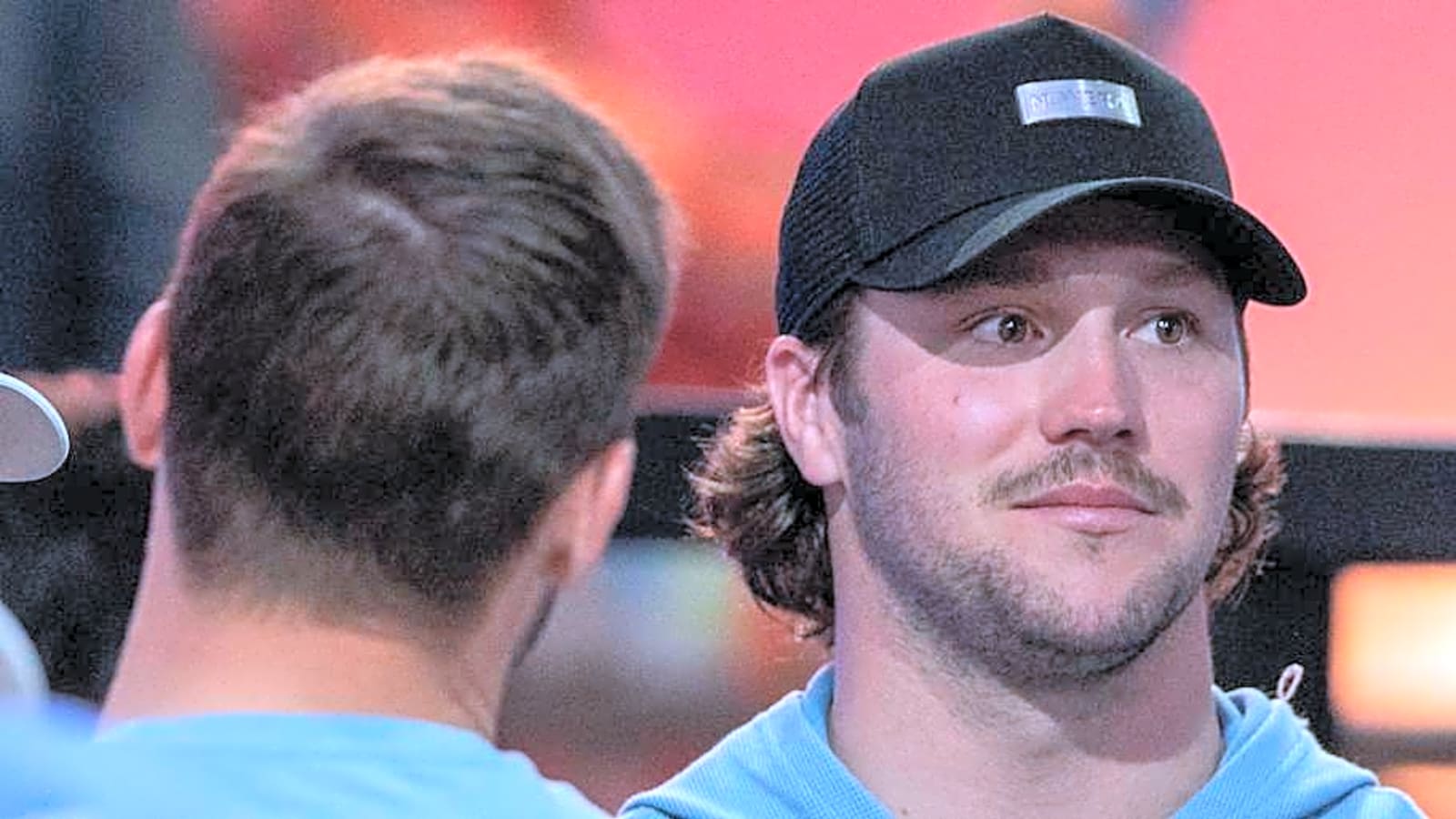Radim Mrtka was ready to take on more minutes, less space and more challenges.
Mrtka’s ice time diminished in the top men’s hockey league in Czechia in the fall of 2024, so he headed to the United States to see if he could prove his value by playing in a different brand of hockey.
The transition wasn’t drastically challenging from a hockey standpoint. He adjusted to playing on a smaller ice surface. The 6-foot-6 defenseman fully utilized his size and reach. He evaluated on-ice situations and quickly made decisions in response, rather than in reaction.
The biggest quandary for Mrtka, the Buffalo Sabres’ top draft pick in June? Grasping the English language on a conversational level.
He learned classroom English growing up in Havlickuv Brod, Czechia. But when it came to colloquial English – a necessity in communicating on the ice, in the locker room and in everyday life in North American hockey, Mrtka suddenly found himself at a loss.

Defenseman Radim Mrtka tries to put a shot on goal during Sabres development camp on July 3 at LECOM Harborcenter.
“I arrived and I couldn’t even understand (English), and I couldn’t even speak,” Mrtka said. “But it just came to me.”
He quickly adapted. His future hinged on it.
In less than a year, Mrtka has gone from a gangly teenager who has played against grown men – including former NHL great Jaromir Jagr – to a top-tier prospect and a first-round NHL draft pick. Language was an early barrier, but hockey wasn’t.
“It’s one of your dreams to be drafted, especially that high,” said Mrtka, whom the Sabres picked at No. 9 in the first round of this year’s NHL draft.
Deciding to move to the United States was a strategic choice for a hockey player who only decided to get serious about pursuing the sport within the last four years.
From Czechia to Seattle
Mrtka, 18, joined Ocelari Trinec’s development program when he was 15 and began the 2024-25 season with Trinec’s team in the Czech Extraliga, the country’s top professional league. Trinec had won five consecutive Extraliga championships from 2019-2024 – the Extraliga did not have a playoff tournament in 2020 due to the Covid-19 pandemic.
“There were many great players who played in the NHL, so I wanted to have some experience with them in hockey, and learn more about hockey,” Mrtka said.
He scored four goals with 11 assists and was plus-16 in 29 games in 2023-24 and 2024-25 for Trinec’s Under-20 team. After registering only one assist in 10 games and averaging about 10 minutes of ice time per game for Trinec’s top team, Mrtka realized he had to find another route in order to refine his own game.
The best possibility for Mrtka to develop was about 5,200 miles away from Czechia in the Pacific Northwest.
The Canadian Hockey League allows teams in its three leagues – the Western Hockey League, the Ontario Hockey League and the Quebec Major Junior Hockey League – to select a limited number of players from outside of North America.
The Seattle Thunderbirds of the WHL selected Mrtka 72nd overall in the 2024 import draft, essentially taking a flier on the defenseman, with the premise of being patient. Not just for when he would arrive in Seattle, but how he could impact the team.
Mrtka asked for his release from Ocelari Trinec and signed with the Thunderbirds in late November, then made his WHL debut Nov. 29 in a 3-2 shootout win at Victoria. He averaged 25-30 minutes of ice time, scored three goals and had 32 assists and was plus-10 in 43 regular-season games with Seattle, and led the Thunderbirds’ defensemen in scoring last season.
He found his cadence by facing opponents who were close to his age. He also helped Seattle become playoff eligible in the spring. The Thunderbirds were 8-13-3 when Mrtka joined, but earned the last of eight playoff berths in the WHL’s Western Conference in March.
“He could dictate the game,” Seattle coach Matt O’Dette said. “The curiosity is, how is he going to adjust to the North American style of play? It was seamless and suited his skill set. He can move the puck well and he has really good vision. He has to make quicker decisions and plays happen faster, and there’s not as much time and space, but he can evaluate the forecheck and has escapability, and he can make the plays that people wondered if he could adjust to that. He took to that immediately and that opened a lot of peoples’ eyes.”
Including the Buffalo Sabres.
Sabres assistant general manager Jerry Forton said after the draft in June that he had “21 or 22 viewings” of Mrtka last season, including the Hlinka Gretzky Cup last August in Edmonton. Mrtka helped Czechia’s U-18 team reach the gold-medal game – Canada defeated Czechia 2-1 – but he averaged 21 minutes a game and displayed his playmaking abilities.

Radim Mrtka speaks to reporters during Sabres development camp on June 30 at LECOM Harborcenter.
“He played in the men’s league (in Czechia) and he’s probably too good to play junior hockey over in Czechia and most of Europe, but the men’s league was accelerated for him,” Forton said. “He could handle it for a while, but playing in a very successful organization, his minutes started to dwindle.”
Mrtka had to adjust to a smaller rink when he joined the Thunderbirds. International rinks are 200 feet by 100 feet, while North American rinks are generally 200 feet by 85 feet, and lend to a more physical style of play in which opportunities are created by working in the corners and in front of the net, rather than primarily using the entire ice surface to create plays.
“He came over to play in Seattle and when you saw the growth in his game, jumping in the WHL, which is not an easy league, just adjusting to the size of the rink and the different style of play for a defenseman, and I caught a couple of poor games early, as did some of our other scouts, but we also caught some high-end games,” Forton said. “At about the 10-game mark, he just took off.”
Embrace the chatter
But then there was the part about communicating.
“I couldn’t speak English from the start,” Mrtka said.
It’s customary in parts of Europe for children to start learning English in grade school, but speaking English in a classroom is one thing. Using it in everyday life as a second language is a constant practice.
He still struggled with a few words, even as he spoke with NHL reporters in his first days as the Sabres’ top draft pick.
English is the de facto NHL vernacular, even in a league that has grown many international branches in the last 40-45 years. Look around NHL locker rooms and you’ll find players from Sweden, Finland, Latvia Russia, Czechia, Slovakia and even “Down Under.” Ottawa defenseman Jordan Spence was born in Australia, then raised in Osaka, Japan, and Prince Edward Island, where he learned English as a teenager.
Even some of the NHL’s superstars have had to learn English. For example, Mario Lemieux, the Pittsburgh Penguins’ superstar and Hockey Hall of Famer, primarily spoke French when he came to the United States from Montreal in 1984. He learned conversational English by living with a host family in Pittsburgh, taking English classes and watching 1980s American soap operas.
The NHL and hockey have grown more international, which provides players from outside of the United States and Canada more of a cushion when it comes to English immersion. They’re not the only ones learning English or another language. So are some of their teammates.
Mrtka’s adjustment to learning English took some time.
“There was no learning curve for him,” O’Dette, Seattle’s coach, said. “He knew all the hockey terms, but it was outside hockey, where the language barrier hit.”
Being around teammates on the Thunderbirds helped when it came to picking up slang or unfamiliar terms in casual conversation. So did Mrtka’s affinity for playing video games and for using social media.
Mrtka’s teammate, Matej Pekar, is also from Czechia. Mrtka’s defensive partners, Kaleb Hartmann and Hyde Davidson learned to cut through the language barrier when teaming with Mrkta. Both played at least two seasons in the WHL and, as O’Dette explained, broke down on-ice situations with Mrtka. Mrtka responded, in kind, with his on-ice instincts and in-game intelligence.
Soon, the chatter came.
“I listened and learned, and it gets so much better during the year,” Mrtka said. “I just learned by listening.”
Mrtka, O’Dette said, takes a professional approach to hockey, but his humor started to emerge as he learned more of the language.
“Watching some of his interviews in the draft process, I laughed several times at some of his answers,” O’Dette said. “And I was blown away with how good some of his English was, and how it improved, even since the end of our season.”
Talking the talk in Buffalo
The Sabres announced Tuesday that Mrtka has signed a three-year, entry-level contract and as of Thursday afternoon, he was one of only eight first-round picks to sign with the team that drafted him this year.
It’s not immediately clear if Mrtka will join the Sabres out of training camp – he could go back to Seattle for another season of major-junior hockey. He also has some growing to do in order to prepare to become an NHL player.
“He’s still growing into his body, and he’s going to have some awkward moments,” Forton said. “I project his skating to be very good, in time, but he has some awkward moments.”
O’Dette, Mrtka’s coach in Seattle, has two objectives in helping Mrtka continue to develop into an NHL player: Add more bite and further evolve Mrtka’s game.
As for the language barrier? Mrtka continues to climb over it, even leaping at some points.
At the NHL scouting combine in June at LECOM Harborcenter, Mrtka regaled reporters about the time he played against Czech hockey legend Jagr, who at 53 years old continues to play professionally.
“You don’t really want to play physical against him, because if you would injure him, probably the whole nation would be mad at us,” Mrtka quipped.
A few weeks later, he answered a question about the most memorable part of Sabres development camp, which ended July 3 at Harborcenter.
Mrtka answered with a balance of earnestness and comedy.
“I would say testing,” he said. “I think almost, like, half the guys puked. So, it was pretty funny!”

-1749948767-q80.webp)
-1755054232-q80.webp)
